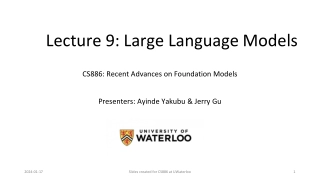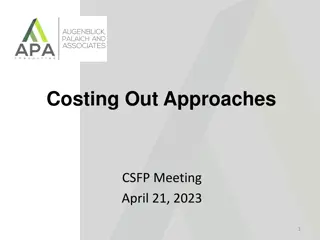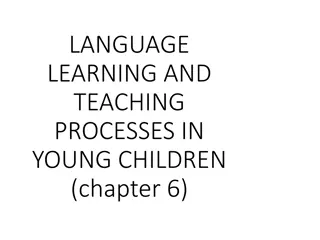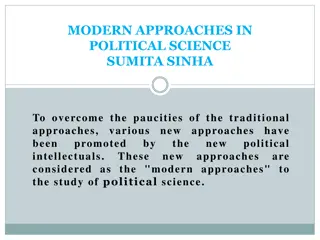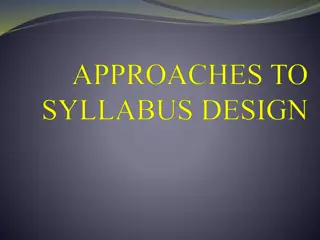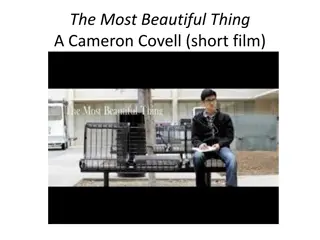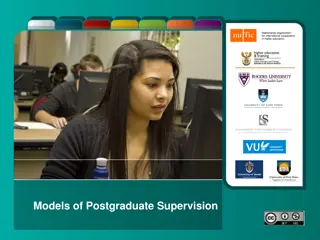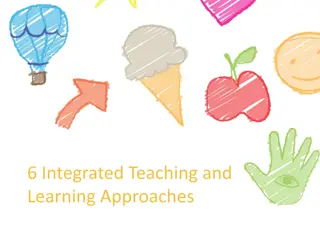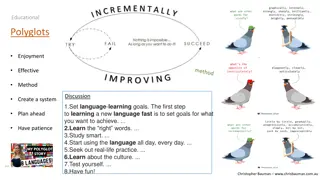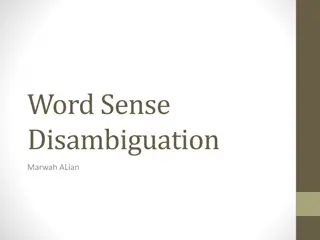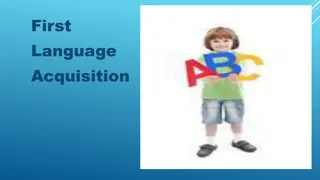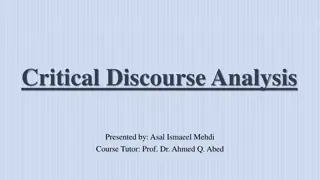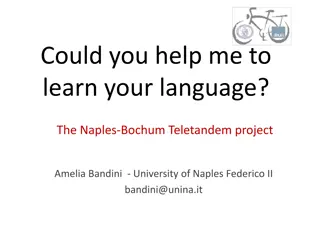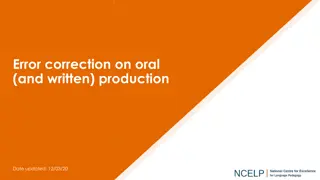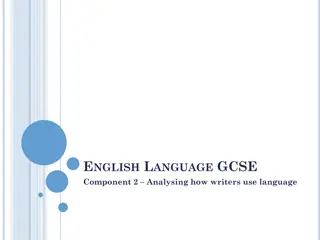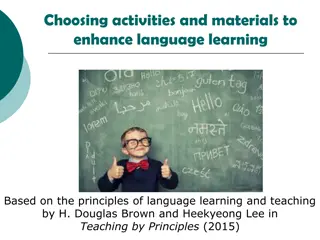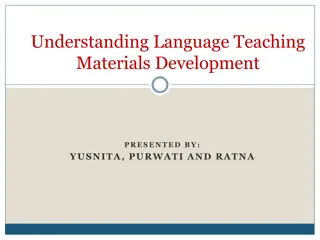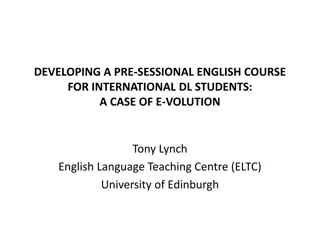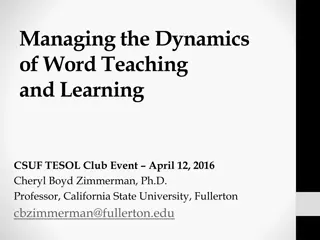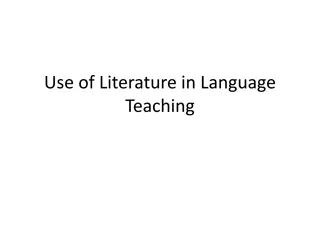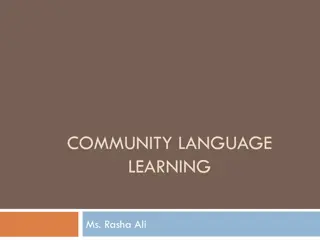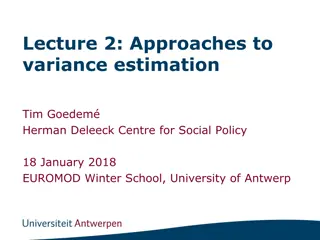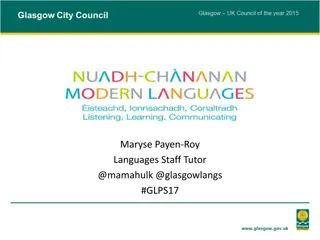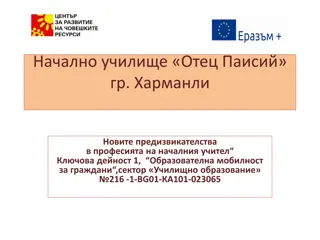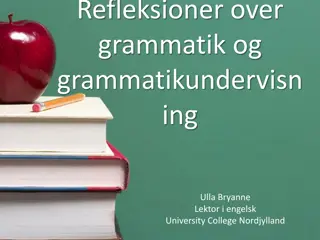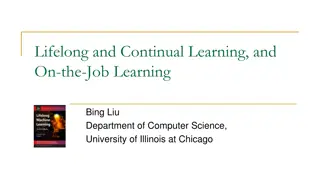Community Language Learning
Community Language Learning (CLL) involves collaborative language learning where teachers act as counselors and learners work together. CLL teachers aim to teach communicative language skills, foster self-learning, and mutual learning among students through valuing thoughts and feelings. Popular
2 views • 14 slides
Career Opportunities and Challenges in Translation & Interpreting Pedagogy Post-Pandemic
The APTIS 2022 conference explores new avenues in Translation and Interpreting (T&I) pedagogy amidst a changing landscape. Dr. Bego A. Rodriguez highlights emerging roles for T&I graduates. The context reveals a decline in language learning in the UK, impacting the Language Service Industry. The UK'
0 views • 13 slides
Recent Advances in Large Language Models: A Comprehensive Overview
Large Language Models (LLMs) are sophisticated deep learning algorithms capable of understanding and generating human language. These models, trained on massive datasets, excel at various natural language processing tasks such as sentiment analysis, text classification, natural language inference, s
2 views • 83 slides
Language Study Community – Enhance Your Language Skills
Joining a Language Study Group is a fantastic way to take your language learning to the next level. By leveraging the power of Group Study, you can immerse yourself in the language, enhance your understanding, and build confidence in your speaking abilities. Read full article \/\/explainlearning.com
1 views • 3 slides
Costing Out Approaches
Costing out approaches and studies have been developed to ensure schools and districts have adequate resources to meet state education standards. Implementing these approaches involves professional judgment, evidence-based benchmarks, and data requirements. Using multiple approaches allows for trian
0 views • 12 slides
Academic Language Demands and Supports in Instructional Planning
Academic Language Demands and Supports are crucial in educational settings to ensure comprehension and usage of language by students. This content discusses embedding language demands in lesson plans, providing language supports, and peer review activities to enhance academic language skills. The fo
6 views • 10 slides
The Significance of Media in Language Learning
Media plays a crucial role in language learning by raising awareness of the ideology behind linguistic structures and providing valuable information on society and culture. Linguists are drawn to media language for research purposes and to understand its impact on language use and attitudes. Media s
12 views • 5 slides
Understanding Translation: Key Concepts and Definitions
Translation involves transferring written text from one language to another, while interpreting deals with oral communication. Etymologically, the term "translation" comes from Latin meaning "to carry over." It is a process of replacing an original text with another in a different language. Translat
11 views • 76 slides
Language Learning and Teaching Processes in Young Children
Development of language in young children is influenced by various factors such as their cultural and linguistic environment, unique characteristics, and interactions with adults. Optimal language development requires language stimulation from the environment. Varied cultural practices impact langua
1 views • 51 slides
Modern Approaches in Political Science: Overview and Characteristics
Explore modern approaches in political science pioneered by intellectuals to address the limitations of traditional methods. These approaches emphasize empirical data, interdisciplinary study, and scientific methods to draw conclusions beyond political structures and historical analysis. Key modern
1 views • 13 slides
Understanding Language Teaching Syllabus: Integration, Theory, and Approaches
Language Teaching Syllabus involves the integration of subject matter and linguistic elements, guided by theories of language and learning. Various approaches like Grammatical, Situational, Communicative, and Analytic are used to structure syllabi. Breaking language into parts aids in sequential lea
1 views • 28 slides
Exploring Language and Communication Through a Short Film
In this lesson, students will watch a 10-minute short film titled "The Most Beautiful Thing" by Cameron Covell. They will reflect on the value of learning another language, analyze how facial expressions and body language convey emotions, and develop empathy towards those facing language barriers or
0 views • 29 slides
Enhancing Language Learning Across the Curriculum in B.Ed. 1st Year Course
Language Across the Curriculum (LAC) emphasizes that language learning should occur across all subjects, not just in language classrooms. It highlights the importance of incorporating language development into every learning activity, fostering multilingualism in schools. Language plays a crucial ro
2 views • 34 slides
Understanding Models of Postgraduate Supervision and Different Supervisory Approaches
Explore the various roles, styles, and models of postgraduate supervision, delving into the distinctions between supervisor tasks, interaction approaches, and supervision structures. Learn how different supervision models like one-on-one, panel, project, and doctoral programme supervision impact res
1 views • 13 slides
Integrated Teaching and Learning Approaches for Children: A Comprehensive Overview
Explore integrated teaching and learning approaches that combine guided play, adult-led learning, and child-directed play to create effective learning environments. Understand the importance of play in children's development, the role of adults in facilitating play, and the concept of guided play an
1 views • 30 slides
Effective Language Learning Strategies and Tips
Discover effective methods to enhance your language learning experience, including setting goals, expanding vocabulary, studying efficiently, immersing yourself in the language, seeking real-life practice, exploring the culture, testing your knowledge, and most importantly, having fun along the way.
0 views • 4 slides
Approaches to Study Comparative Politics: Traditional vs. Modern Perspectives
This chapter discusses the importance of approaches in the study of comparative politics, categorizing them into traditional and modern perspectives. Traditional approaches include philosophical, historical, and traditional institutional approaches, highlighting their strengths and limitations. Mode
0 views • 7 slides
Understanding Word Sense Disambiguation: Challenges and Approaches
Word Sense Disambiguation (WSD) is a complex task in artificial intelligence that aims to determine the correct sense of a word in context. It involves classifying a word into predefined classes based on its meaning in a specific context. WSD requires not only linguistic knowledge but also knowledge
2 views • 12 slides
Understanding First Language Acquisition Process
First language acquisition is the process through which humans develop the capacity to perceive, comprehend, and effectively use language to communicate. It primarily focuses on infants acquiring their native language. Basic requirements, caregiver speech features, and the acquisition schedule play
0 views • 19 slides
Introduction to Critical Discourse Analysis (CDA)
Critical Discourse Analysis (CDA) is the study of language use in social contexts, integrating social theories with discourse analysis methods. Originating in the 1970s as Critical Linguistics (CL), CDA evolved to focus on how language reflects and shapes social meaning. The relationship between CL
0 views • 32 slides
Innovative Learning Management System - LAMS at Belgrade Metropolitan University
Belgrade Metropolitan University (BMU) utilizes the Learning Activity Management System (LAMS) to enhance the learning process by integrating learning objects with various activities. This system allows for complex learning processes, mixing learning objects with LAMS activities effectively. The pro
4 views • 16 slides
Enriching Language Learning with Teletandem Activities: A Blended Approach
The Naples-Bochum Teletandem project led by Amelia Bandini at the University of Naples Federico II focuses on enhancing German language courses through a blended learning approach. The project aims to combine formal instruction with informal language learning environments to enrich students' cultura
3 views • 27 slides
Speech and Language Developmental Milestones: A Bilingual/Multilingual Perspective
Speech and language developmental milestones are crucial for children, regardless of their home language. These milestones encompass receptive language, expressive language, pragmatics, and articulation and phonology. Understanding how a child hears and talks from birth to one year is essential, as
1 views • 23 slides
Enhancing Language Learning Through Error Correction Strategies
Explore the importance of error correction in language learning based on recommendations from The Pedagogy Review. Discuss strategies to anticipate, correct, and provide feedback on errors in both spoken and written language to facilitate effective language acquisition and communication. Consider th
1 views • 66 slides
Analyzing Writer's Language Use in English Language GCSE Component 2
In English Language GCSE Component 2, students learn to analyze how writers use language. The learning objective focuses on commenting, explaining, and analyzing language use with relevant subject terminology. The exam assesses students on their ability to interpret and explain a writer's thoughts,
0 views • 12 slides
Enhancing Language Learning through Effective Classroom Practices
Explore the principles of language learning and teaching by Brown and Lee in "Teaching by Principles" (2015). Discover how automaticity, transfer, and task design impact language acquisition in the classroom. Emphasize meaningful interactions, purposeful tasks, and the balance between controlled and
0 views • 33 slides
Exploring Language Teaching Materials Development
Language teaching materials play a crucial role in language learning processes. They can be informative, instructional, experiential, eliciting, or exploratory. Materials development involves various processes such as evaluation, adaptation, design, production, exploitation, and research. Frameworks
0 views • 30 slides
Introduction to Language Technologies at Jožef Stefan International Postgraduate School
This module on Knowledge Technologies at Jožef Stefan International Postgraduate School explores various aspects of Language Technologies, including Computational Linguistics, Natural Language Processing, and Human Language Technologies. The course covers computer processing of natural language, ap
0 views • 27 slides
Enhancing English Language Support for Online Distance Learning Students at University of Edinburgh
University of Edinburgh's English Language Teaching Centre developed an Online Academic Presessional Language course (OPAL) to support Online Distance Learning (ODL) students. The course focused on academic writing to enhance written accuracy and appropriacy, using existing ELTC materials. Research,
0 views • 27 slides
Exploring Sociolinguistics: Language Variation and Social Factors
Sociolinguistics delves into the study of language variation influenced by social factors, examining the relationship between language and its social context. It explores various aspects like standard pronunciation, language choice, speech acts, language components, language variety, and factors suc
0 views • 73 slides
Understanding Assembly Language Programming for Computing Layers
Assembly language is a low-level programming language that enables direct interaction with a computer's hardware components. This content explores the fundamentals of assembly language, the relationship between human-readable machine language and binary code, an assembly language program for multipl
0 views • 31 slides
Insights into Word Teaching and Learning Dynamics in SLA
Explore the nuances of word teaching and learning dynamics in Second Language Acquisition (SLA) through cognitive research, cognitive approaches, and the importance of word ownership for confidence in language proficiency. The role of socially-embedded approaches to SLA and strategies like repetitio
0 views • 28 slides
Understanding Language Anxiety in Foreign Language Learning and Teaching
Explore the impact of language anxiety on students and teachers in foreign language learning and teaching contexts through insights from Dr. Christina Gkonou's research. Delve into the theoretical background, implications for language education, and real-life experiences shared at the Essex Language
0 views • 25 slides
Exploring Literature in Language Teaching
Literature plays a significant role in language teaching as it offers authentic materials, motivates learners, and enhances cross-cultural awareness. Literary works help develop language skills and critical thinking while providing insights into cultural aspects and artistic expressions. Various app
0 views • 27 slides
Effective Community Language Learning Method by Ms. Rasha Ali
Community Language Learning (CLL) method emphasizes understanding students' feelings and creating a supportive environment for language learning. This approach, influenced by the Counseling-Learning approach, focuses on building relationships, reducing anxiety, and promoting effective communication
1 views • 15 slides
Approaches to Variance Estimation in Social Policy Research
This lecture discusses approaches to estimating sampling variance and confidence intervals in social policy research, covering topics such as total survey error, determinants of sampling variance, analytical approaches, replication-based approaches, and the ultimate cluster method. Various methods a
1 views • 34 slides
The Role of Play in Language Learning and the Critical Age Theory
The critical age theory suggests that young children have greater brain plasticity for language internalization, while adults can learn L2 faster due to developmental stages. Learning a second language early provides advantages in accent acquisition. Affective relationships and play are crucial in l
0 views • 15 slides
Language Teaching Approaches Overview
Various language teaching methods such as PPP (Presentation, Practice, Production), TBL (Task-based Learning), TPR (Total Physical Response), and CLIL (Content and Language Integrated Learning) are explored in this document. The PPP method involves three stages - presentation, practice, and producti
0 views • 14 slides
Exploring Reflections on Grammar and Grammar Teaching in Language Education
Delve into a comprehensive examination of grammar and its instructional methods in language education through the insights shared by Ulla Bryanne, an English lecturer at University College Nordjylland. The content covers various aspects such as the transformation of students into teachers, the essen
1 views • 28 slides
Lifelong and Continual Learning in Machine Learning
Classic machine learning has limitations such as isolated single-task learning and closed-world assumptions. Lifelong machine learning aims to overcome these limitations by enabling models to continuously learn and adapt to new data. This is crucial for dynamic environments like chatbots and self-dr
0 views • 32 slides


